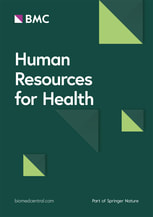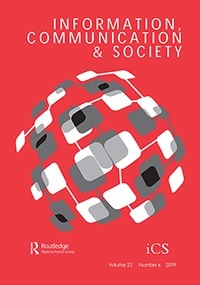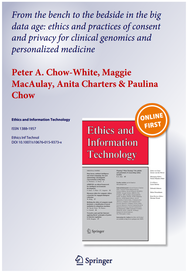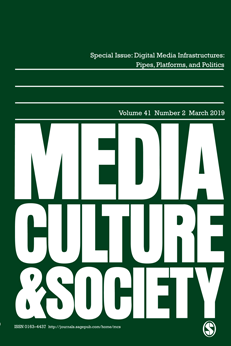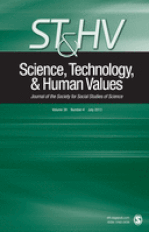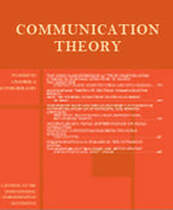Adopting clinical genomics: a systematic review of genomic literacy among physicians in cancer care
|
|
X
BMC 2018This article investigates the genomic knowledge of oncology care physicians in the adoption of clinical genomics. We apply Rogers’ knowledge framework from his diffusion of innovation theory to identify three types of knowledge in the process of translation and adoption: awareness, how-to, and principles knowledge. The objectives of this systematic review are to: (1) examine the level of knowledge among physicians in clinical cancer genomics, and (2) identify potential interventions or strategies for development of genomic education for oncology practice. GeNA Lab 2019 |
Knowledge, attitudes, and values among physicians working with clinical genomics: a survey of medical oncologists
|
|
X
HRFH 2017It has been over a decade since the completion of the Human Genome Project (HGP), genomic sequencing technologies have yet to become parts of standard of care in Canada. This study investigates medical oncologists' (MOs) genomic literacy and their experiences based on their participation in a cancer genomics trial in British Columbia, Canada GeNA Lab 2019 |
"Warren Buffet is my cousin": Shaping Public Understanding of Big Data Biotechnology, Direct-to-Consumer Genomics and 23andMe on Twitter
|
|
X
ICS 2017Scholars, educators, regulators, pundits, and other observers are advocating for regulation and oversight of direct-to-consumer (DTC) genomic testing. As a result, the technology has been subject of highly visible public and regulatory controversy. In this article, we explore the nature and the shape of the sentiment of public discourse about the DTC company, 23andMe. We conduct a quantitative content analysis and qualitative framing analysis on Tweets. We find that the discourse surrounding DTC genomics and 23andMe is largely positive. We also identify a number of frames users deploy to debate, discuss, and share their experiences with DTC genomics and 23andMe. We argue that these frames create meaning around this emerging technology for its users. GeNA Lab 2019 |
An Empirical Study of the Rise of Big Data in Business Scholarship
|
|
X
IJIM 2016Big data has captured the interests of scholars across many disciplines over the last half a decade. Business scholars have increasingly turned their attention to the impact of this emerging phenomenon. Despite the rise in attention, our understanding of what big data is and what it means for organizations and institutional actors remains uncertain. In this study, we conduct a systematic review on “big data” across business scholarship over the past six years (2009–2014). We analyzed 219 peer-reviewed academic papers from 152 journals from the most comprehensive business literature database. We conducted the systematic review both quantitatively and qualitatively using the data analysis software NVivo10. Our results reveal several key insights about the scholarly investigation of big data, including its top benefits and challenges. Overall, we found that big data remains a fragmented, early-stage domain of research in terms of theoretical grounding, methodological diversity and empirically oriented work. These challenges serve to improve our understanding of the state of big data in contemporary research, and to further prompt scholars and decision-makers to advance future research in the most productive manner. GeNA Lab 2019 |
Genomic Big Data and Privacy: Challenges and Opportunities for Precision Medicine
|
|
X
CSCW 2016Genome science is rapidly shifting from research labs and biobanks to the clinical setting. The resulting genomic big data, or large-scale networked genetic material, is a disruptive technology. On one hand, clinical genomics advances life-saving innovation through precision medicine. On the other, the digital databases they are built upon raise new concerns for informational risk to personal privacy. While a traditional biomedical approach focuses on risks and benefits to the human body, our socio-technical analysis sheds lights on the emerging terrain of the human body as digital code. In this paper, we analyze emerging issues related to clinical genomics based on a 3-year collaborative clinical research project to develop a genomic test for Acute Myeloid Leukemia (AML) cancer in British Columbia (BC), the first of its kind in Canada. We found the most pressing issues for genomic researchers and clinicians were challenges around informed consent, return of results and return of incidental findings. In light of technological advances and the emerging context of networked privacy, we outline several recommendations for best practices in diffusing clinical genomics to the healthcare system. GeNA Lab 2019 |
From the bench to the bedside in the big data age: ethics and practices of consent and privacy for clinical genomics and personalized medicine
|
|
X
EIT 2015Scientists and clinicians are starting to translate genomic discoveries from research labs to the clinical setting. In the process, big data genomic technologies are both a risk to individual privacy and a benefit to personalized medicine. There is an opportunity to address the social and ethical demands of various stakeholders and shape the adoption of diagnostic genome technologies. We discuss ethical and practical issues associated with the networking of genomics by comparing how the European Union (EU) and North America understand and practice notions of privacy and consent in research. An overview of international policy suggests the embedding of genomics within digital networks and the Internet creates conditions that challenge the management of privacy and consent in the age of big data. The risks of re-identification, informational harms, and data security vulnerabilities are issues that need to be better addressed in the clinical setting to reconcile the unpredictable pathway of research and practice in the networked information society. British Columbia, Canada GeNA Lab 2019 |
Media encoding in science fiction television: Battlestar Galactica as a site of critical cultural production
|
|
X
MCS 2017We examine the television show Battlestar Galactica (BSG) through interviews with creative people working on the show to illustrate the production context of the show and the science fiction (sf) genre. Media scholars suggest sf stories are critical stories about our political systems and our anxieties about new technologies, social change, race, gender, class, and religious conflicts. We investigate constraints and agency in the production of BSG as a site of critical cultural commentary and the politics of racial and gender representation in the series. We find that the creators behind BSG struggle with the moral and political nature of the stories they create, within the constraints of power, social structures, and a neoliberal economy and in doing so actively participate in their own acts of meaning-making in the production process. GeNA Lab 2019 |
Privacy Without Guarantees: Healthcare and Genomics in the age of Big Data
|
|
X
Data Power 2015Big data technologies have transformed the complex whole genome sequencing process from a multi-billion-dollar, decade-long race to a relatively affordable service that costs close to $1000 and takes about a week. As patients are translated into petabytes of digital data, our shifting sociotechnical landscape is characterized by new opportunities for medical breakthroughs, the emergence of “personalized medicine,” as well as new informational risks to privacy. Genomic big data is disruptive to some of our most fundamental social categories: human and digital, in vitro and in silico, the bench and the bedside. This creates new challenges for the public, practitioners, and policymakers in terms of managing a new type of personal information in the healthcare system. As scholars of the social studies of science and technology have shown, when a new technology moves from a small group of expert users into a broader context, in this case a population-wide health care system, new issues and practices arise. We analyze the socio-cultural implications of “privacy without guarantees” at the intersection of healthcare and genomic data regulation in Canada. Our particular site of investigation is a genomic test for cancer treatment currently under development. We have conducted documentary and policy analysis, as well as interviews with active genome researchers, privacy commissioners, and decision-makers in the province of British Columbia, area to explore the issues of informed consent, return of results and incidental findings at the point of care. Our resulting recommendations for managing privacy synthesize our empirical findings in conjunction with related international guidelines. GeNA Lab 2019 |
Bi-directional Shaping and Spaces of Convergence: Interactions Between Biology and Computing From the First DNA Sequencers to Global Genome Databases
|
|
X
CJCGenomic big data is an emerging information technology, which presents new opportunities for medical innovation as well as new challenges to our current ethical, social and legal infrastructure. Rapid, affordable whole genomic sequencing translates patients’ most sensitive personal information into petabytes of digital health data. While a biomedical approach traditionally focuses on risks and benefits to the human body, the fields of communication and science and technology studies (STS) can provide some of the critical and theoretical tools necessary to navigate the newly emerging terrain of the human body as digital code. Core areas of expertise from these fields including the Internet, the network society and the social constructions of technology ground our discussion of the social implications of open access genomic databases, privacy and informational risk. GeNA Lab 2019 |
Data Mining Difference in the Age of Big Data: Communication and the Social Shaping of Genome Technologies from 1998 to 2007
|
|
X
IJC 2013If the 1990s was all about the information superhighway and the network society, then the first 10 years of the 21st century is perhaps best described as the decade of data. Actors in different enterprises worked feverishly to develop innovative database and data mining technologies for institutional goals such as marketing, social networking, and scientific discovery. These researchers and data entrepreneurs follow an emerging belief that gathering and mining massive amounts of digital data will give objective insight into human relations and provide authentic representations for decision-making. On the surface, the technologies used to mine big data have the appearance of value-free and neutral inquiry. However, as information entrepreneurs use database and data mining technologies to purposively organize the social world, this seeming neutrality obfuscates domain assumptions and leaves cultural values and practices of power unexamined. We investigate the role of communication and social shaping of database and data mining technologies in the institutional context of genome science to understand how various stakeholders (scientists, policy makers, social scientists, and advocates) articulate racialized meanings with biological, physical, and big data. We found a rise in the use of racial discourse that suggests race has a genetic foundation. GeNA Lab 2019 |
Bi-directional Shaping and Spaces of Convergence: Interactions Between Biology and Computing From the First DNA Sequencers to Global Genome Databases
|
|
X
ST&HV (2012)This paper proposes a new bi-directional way of understanding the convergence of biology and computing. It argues for a reciprocal interaction in which biology and computing have shaped and are currently reshaping each other. In so doing, we qualify both the view of a natural marriage and of a digital shaping of biology, which are common in the literature written by scientists, STS, and communication scholars. The DNA database is at the center of this interaction. We argue that DNA databases are spaces of convergence for computing and biology that change in form, meaning, and function from the 1960s to the 2000s. The first part of the paper shows how, in the 1980s, DNA sequencing shifted from passively incorporating computers to be increasingly modelled in digital coding and decoding. Information retrieval algorithms, reciprocally, were altered according to the peculiarities of DNA in the first sequence-storage databases. The second part of the paper investigates the impact of these reciprocal interactions and globalization on the organization of research centers, ways of conducting big science, and scientific values. Through convergence and new technologies such as data mining, biology and computing were transformed technologically, institutionally, and culturally into a new bio-data enterprise called genomics. GeNA Lab 2019 |
“There's an App for That”: Mediating mobile moms and connected careerists through smartphones and networked individualism
|
|
X
FMS (2012)If the 1990s was all about the information superhighway and the network society, then the first 10 years of the 21st century is perhaps best described as the decade of data. Actors in different enterprises worked feverishly to develop innovative database and data mining technologies for institutional goals such as marketing, social networking, and scientific discovery. These researchers and data entrepreneurs follow an emerging belief that gathering and mining massive amounts of digital data will give objective insight into human relations and provide authentic representations for decision-making. On the surface, the technologies used to mine big data have the appearance of value-free and neutral inquiry. However, as information entrepreneurs use database and data mining technologies to purposively organize the social world, this seeming neutrality obfuscates domain assumptions and leaves cultural values and practices of power unexamined. We investigate the role of communication and social shaping of database and data mining technologies in the institutional context of genome science to understand how various stakeholders (scientists, policy makers, social scientists, and advocates) articulate racialized meanings with biological, physical, and big data. We found a rise in the use of racial discourse that suggests race has a genetic foundation. GeNA Lab 2019 |
Race After the Internet
|
|
X
Routledge Press (2011)In Race After the Internet, Lisa Nakamura and Peter Chow-White bring together a collection of interdisciplinary, forward-looking essays exploring the complex role that digital media technologies play in shaping our ideas about race. Contributors interrogate changing ideas of race within the context of an increasingly digitally mediatized cultural and informational landscape. Using social scientific, rhetorical, textual, and ethnographic approaches, these essays show how new and old styles of race as code, interaction, and image are played out within digital networks of power and privilege. Race After the Internet includes essays on the shifting terrain of racial identity and its connections to social media technologies like Facebook and MySpace, popular online games like World of Warcraft, YouTube and viral video, WiFi infrastructure, the One Laptop Per Child (OLPC) program, genetic ancestry testing, and DNA databases in health and law enforcement. Contributors also investigate the ways in which racial profiling and a culture of racialized surveillance arise from the confluence of digital data and rapid developments in biotechnology. This collection aims to broaden the definition of the "digital divide" in order to convey a more nuanced understanding of access, usage, meaning, participation, and production of digital media technology in light of racial inequality. GeNA Lab 2019 |
Do Health and Forensic DNA Databases Increase Racial Disparities?
|
|
X
PLoS Medicine (2011)The issue of the digital divide is a growing concern in health and forensic DNA databases, reflecting structural disparities in biomedical research and policing. Over the last decade, the majority of DNA samples in population studies are from individuals of European origin. Individuals from Asian, African, Latino, and aboriginal groups are underrepresented. Forensic DNA databases are growing to mirror racial disparities in arrest practices and incarceration rates. Individuals from African American and Latino groups are over-represented in forensic from health DNA databases. Currently, there is little recognition in national and international public policy circles about the “digital divide” in health and law enforcement databases. To avoid reproducing structural patterns of racial inequality, regulators, policy makers, scientists, and law enforcement officials need to address these disparities by supporting policies and mechanisms designed to better protect individuals and groups. GeNA Lab 2019 |
Data, Code, and Discourses of Difference in Genomics
|
|
X
CT, Vol 19 (2009)When James Watson suggested that Africans are less intelligent than Whites in October 2007, he was quickly called "stupid" and "irrational" by the international media. In this article, I argue that this characterization misses the structural elements at play and the larger social transformations where shifting discursive formations of race are converging in old and new ways with developments and innovations in digital culture and information technologies. This article identifies three discursive frames that characterize race talk in contemporary society and explores how they operate in a specific institutional context. Medical biotechnology, like many other enterprises, has been undergoing enormous changes enabled by developments and innovations in computing technologies such as databases and the Internet. As a result, scientific understandings of genetics and race are being recoded in the digital age. GeNA Lab 2019 |
The Informationalization of Race: Communication Technologies and the Human Genome in the Digital Age
|
|
X
IJOC (2008)This paper suggests that a new form of racialization is being produced in the information age through developments and innovations in communication technologies. Increasingly, racial knowledge is being constructed from seemingly neutral and unrelated pieces of information, which are collected, sorted, and analyzed through two key technologies: databases and the Internet. I call this interaction between technology and identity the "informationalization of race." As a mode of representation, a structuring device, and as a biological category, race is undergoing a significant transformation in the digital age. I ground this concept in a case study of the next Human Genome Project — the HapMap Project — to understand how technologies are being shaped in a specific institutional setting. Advances in human genomics have recently re-invigorated scientific research into the relationship between race and biology. Where the HGP concluded that humanity is similar at the genetic level, the HapMap Project began by looking for differences between white, African, and Asian groups. It's anticipated that promising findings from the HapMap project will be of help in developing pharmaceuticals that can target common diseases, such as cancer. However, this development also opens the door to old biological conceptions of race and a new phase of the biopolitics of the human body. GeNA Lab 2019 |
Contact |


